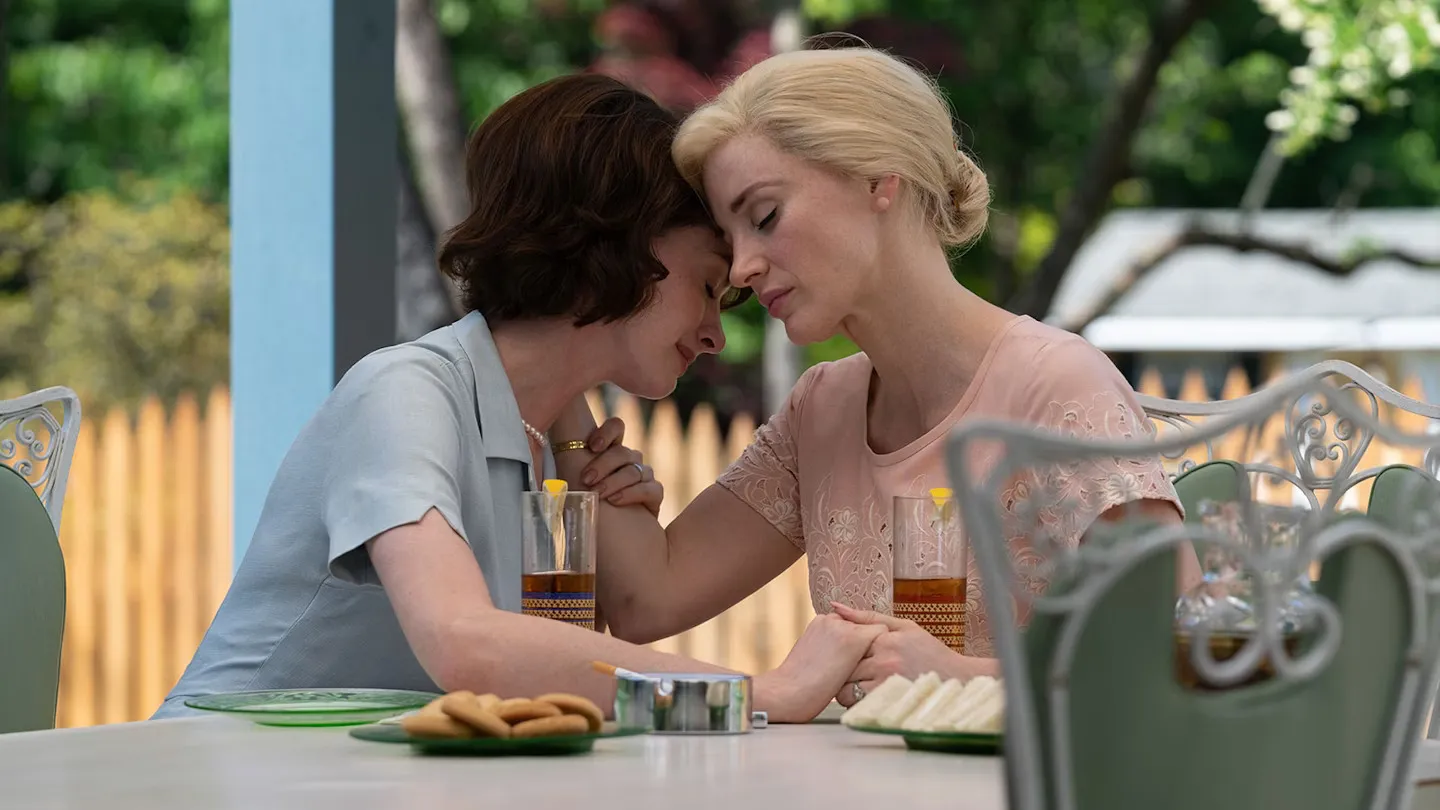Maternal Mayhem: ‘Mothers’ Instinct’ Turns Suburban Bliss into Psychological Warfare

Writer Joseph J. Airdo // Phoenix Film Critics Society
In the lush, meticulously crafted world of 1960s suburbia, where picket fences and perfectly manicured lawns hide dark secrets, “Mothers’ Instinct” weaves a tale of maternal love, paranoia and revenge that will keep audiences on the edge of their seats.
Directed by Benoît Delhomme in his feature film debut, this psychological thriller is a remake of Olivier Masset-Depasse’s 2018 French-language film “Duelles,” itself an adaptation of Barbara Abel’s 2012 novel “Derrière la Haine.” The Americanized version stars Jessica Chastain and Anne Hathaway as two neighboring mothers whose seemingly idyllic lives are shattered by tragedy.
Chastain plays Alice, a devoted mother living next door to her best friend Celine (Hathaway). Their picture-perfect existence is upended when Celine’s young son Max falls to his death from a balcony. What follows is a slow-burning descent into suspicion and madness as the bonds of friendship fray and maternal instincts take a sinister turn.
From the opening scenes, Delhomme establishes a palpable sense of unease that permeates the film. The director’s background as a cinematographer shines through in his meticulous attention to visual detail. Every frame is a carefully composed snapshot of 1960s Americana, with period-accurate set design and costumes that transport viewers back in time. This nostalgic veneer serves as a stark contrast to the psychological horror unfolding beneath the surface.
The film’s greatest strength lies in the powerhouse performances of its leading ladies. Chastain, in particular, delivers a tour de force as Alice. Her portrayal is a masterclass in emotional range, seamlessly transitioning from empathy to paranoia, from grief to rage. We feel every conflicting emotion as it flickers across her face, her internal struggle palpable in every scene.
Hathaway matches Chastain beat for beat, bringing depth and nuance to the role of C\eline. Her initial portrayal of a grieving mother is heartrending, and as the story progresses, she keeps the audience guessing about her true motivations. The chemistry between the two actresses is electric, their on-screen relationship fraught with tension that builds to a fevered pitch.
While the supporting cast, including Anders Danielsen Lie as Alice’s husband, Simon, and Josh Charles as Celine’s spouse, Damian, deliver solid performances, “Mothers’ Instinct” is undeniably a showcase for its leading ladies.
The narrative unfolds at a deliberate pace, with the first act taking its time to establish the characters and their relationships. Some viewers might find this initial setup slow, but patience is rewarded as the tension ratchets up following the tragic balcony incident. From that point on, the film becomes a masterclass in sustained suspense, each scene adding another layer of doubt and paranoia.
Delhomme’s direction shines in his ability to create an atmosphere of constant unease. Even in moments of apparent calm, there’s an undercurrent of dread that keeps viewers on edge. The use of tight framing and unsettling camera angles heightens the claustrophobic feeling, mirroring Alice’s increasing sense of being trapped by her suspicions.
The screenplay, while occasionally predictable for seasoned thriller fans, explores compelling themes that resonate beyond the genre trappings. At its core, “Mothers’ Instinct” is an examination of maternal love pushed to extremes. It poses uncomfortable questions about the lengths a mother might go to protect her child and the devastating psychological impact of grief and envy.
Moreover, the film subtly comments on the societal expectations placed on women in the 1960s. The characters’ interactions with their husbands and the broader community highlight the limited agency women had at the time, adding another layer of complexity to their motivations and actions.
Where “Mothers’ Instinct” falters slightly is in its final act. While the climax is tense and well-executed, it feels somewhat restrained compared to the psychological rollercoaster that precedes it. Some viewers might find themselves wishing for a more explosive resolution to match the intensity of the buildup.
Additionally, the film’s arthouse sensibilities, while elevating it above typical genre fare, may disappoint those expecting more conventional thrills. “Mothers’ Instinct” is more interested in exploring the psychological terrain of its characters than in delivering shock-value scares or twists.
Despite these minor quibbles, “Mothers’ Instinct” is a solid, engaging thriller that offers plenty of food for thought. It’s a film that lingers in the mind long after the credits roll, inviting viewers to ponder the nature of motherhood, friendship and the darkness that can lurk behind the most picture-perfect facades.
With its strong performances, beautiful period aesthetics and thought-provoking themes, “Mothers’ Instinct” is a worthy addition to the psychological thriller genre. While it may not reach the heights of classics in the field, it offers a gripping, intelligent experience that will satisfy discerning viewers.
For those who appreciate nuanced performances, period dramas and psychological depth in their thrillers, “Mothers’ Instinct” is well worth a watch. It’s a film that proves that sometimes the most chilling horrors are those that hit closest to home.




